The writing workshop model is so powerful. But there are a lot of misconceptions floating around about what, exactly, it is – and if it even works!
For example, you might be wondering:
- If workshop writing is more open-ended and student-driven, what about writing?
- Does grammar fit into the workshop model?
- How on earth do I roll out routines, procedures, AND content in the workshop model – when writing is already so challenging for my students?!
It can be a lot to think about! In this post, I’ll help bring some clarity to what the workshop model is (and isn’t!)
I have a video (and transcript, if you prefer to read) that debunks 3 of the top myths about the writing workshop model.
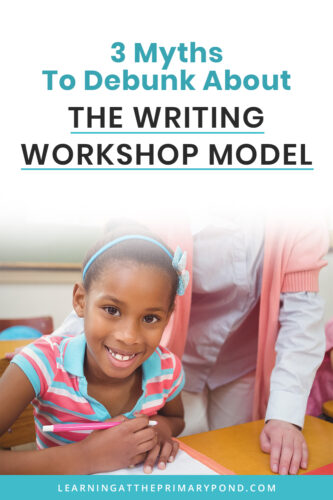
First, let’s define the writing workshop model!
In a nutshell, here are some features of writing workshop – at least the way I run it:
- The entire class is working within one genre, or on a specific skill set.
- The teacher teaches mini-lessons on the genre or specific skill set.
- The teacher models writing frequently.
- Students have daily writing time.
- Students frequently choose their own topics (within a specific genre).
- Students work through the writing process at their own pace.
- “Finishing early” doesn’t exist; students consistently start new writing pieces upon finishing.
- Students have opportunities to collaborate and share their work with others.
- Units of study can last weeks or months.
Now let’s dig in deeper – watch this video to learn 3 myths about writing workshop – and why they’re just not true! (You can also read the transcript if you prefer.)
Watch the video to find out what these 3 myths are!
Transcript if you prefer to read:
“Hey, I’m Alison from Learning At The Primary Pond. I’m a literacy specialist and in this video, I’m going to debunk three common myths about the writing workshop model that just are not true.
First let’s talk about what the writing workshop model is. Now I’m going to give my definition. This can vary a little bit depending on how it’s implemented, but the way I see writing workshop is that generally speaking, the entire class is working on writing projects within one genre or focused on one skill area, but then the kids are choosing individual topics.
For example, the whole class might be working on nonfiction books, but one kid’s working on a book about soccer , one working on a book about parrots and another kid’s working on a book about dogs. They get to choose topics within that overall genre. Now, of course, the teacher is teaching a mini lesson at the beginning of the writing block on a specific skill, but it’s related to that genre that everybody’s working on. There’s usually a lot of modeling of writing in front of the kids that’s part of these mini lessons. After that, the students go off and they have daily writing time. So they’re practicing working again within that genre and then they’re kind of also working through the writing process at their own pace.
If you were to just appear in a writing workshop classroom, you might see some kids brainstorming ideas or getting ready to write a piece. Other kids might be in the middle of a writing piece. While other kids might be finishing up. So not everybody is at the exact same point simply for the fact that kids work at different paces. Some writing projects that a child might choose might be shorter or longer than another topic that another child chooses. Finishing early doesn’t exist in the workshop model because once a child finishes a book or a piece of writing on one topic, they then move on to write another piece on a different topic that’s still within that genre.
So with the informational writing example, maybe they were working on a book about dogs and they finished that, and then they move on to writing a book about baseball. It’s still informational writing within that genre, but it’s just a different topic. Also in the workshop model, students have opportunities to collaborate, to share their work with others, ideally to self-assess and also to do some peer revising and editing. So there’s that kind of community and social aspect of it as well.
Then with a unit, for example, the informational writing, it could last a couple of weeks. It could also last a couple of months. It just kind of depends on how broad the genre is and what you’re having the kids do within that genre. So that’s how I define the writing workshop model. Again, it can kind of look different from classroom to classroom, but I would love to hear in the comments right now, do you do the workshop model? Do you do more specific writing prompts or is there something else that you do? So right now type workshop prompts or other and feel free to share if you do something that’s a little bit different. Would love to hear from you.
So now let’s get into these three myths that aren’t true. Myth number one is that in the writing workshop model, students don’t learn about sentence structure or grammar. It’s just kind of their writing and it’s accepted whatever they write. This is not true. Of course, it depends on how it’s implemented, but as the teacher in the workshop model, ideally, you’re doing tons of modeling. You’re having specific mini lessons on sentence structure, on using capitalization, punctuation, correct grammar, and not all of your mini lessons are on those topics. Sometimes you’re working on ideas or teaching kids how to organize their writing. But at least with my writing workshop units, those grammar and conventions lessons are infused throughout. So students are consistently working on that.
You as the teacher are also sitting down with them one on one, or maybe even in a small group to help them improve their writing in those areas. Another thing that I find is really helpful is to give kids an editing checklist. This comes from my free writing folder tools. I will make sure that we include a link for you so you can download this for free. But anyway, with the editing checklist, there are certain things that the kids are expected to review in their own writing every time they finish a piece of writing. Then I also like to do partner editing where the kids read their writing to each other. I don’t have them read each other’s work, just because I work with the K-2 crowd. At those ages, a lot of times the kids can’t read each other’s writing. So they read their writing to each other and then they use a checklist to go over it and help each other improve.
Of course I don’t make sure that every single piece of writing my students create in the workshop model is a hundred percent correct, because I simply don’t have time for that. But at least one piece of writing, sometimes two, sometimes the middle of the unit and the end of a unit, depending on how long it is, we may publish a piece of writing. So with that piece, I do provide them with more in depth work and feedback, but this myth is just not true that students are just writing whatever.
Yes, we do encourage students to write as much as they can and we do encourage, or I encourage, process over outcome. So I want them to feel comfortable expressing their ideas in writing and I don’t tell them to stop or I don’t get real upset if their grammar or sentence structure isn’t perfect because I know that it’s just part of the developmental process and we work on it over time. That said, writing workshop is absolutely not devoid from grammar and sentence structure. They absolutely work hand in hand.
Myth number two comes from something you might see if you look at student examples of writing in the workshop model. You might see that some of the words are misspelled. So myth number two is that students are not learning how to spell correctly in the writing workshop model. Not true at all. They absolutely are getting opportunities to practice and work on spelling. The way I do it, I have a separate phonics or word work block where we are really, really focusing on spelling, and how sounds work and letters and all that good stuff. So that’s separate from the workshop model.
However, kids need opportunities to practice that and that’s exactly what they get in the workshop model. They’re coming up with words they want to write. It’s not my job as the teacher to come and spell everything for them. It’s their job to stretch out the word and listen for the sounds. Then when we’re working on things like digraphs, for example, in phonics, then they are expected to use that knowledge, and we talk about getting them to apply what they’re learning in phonics to their writing. This is an opportunity for them to practice and apply because that’s really where the rubber hits the road. We can teach them these spelling rules, but if they don’t have opportunities to practice and apply, then they’re probably never going to master them.
As part of my writing workshop lessons, I do include plenty of opportunities for kids to see me use invented spelling and see me apply phonics knowledge to spelling words. I don’t always model correct spelling. I want them to see the process of just doing your best and listening for the sounds you hear. So I really model that a lot, but I do also teach them how to use tools like an alphabet chart. I tell them “Okay, if you want to write the word ‘lemon’, for example, let’s stretch it out. What do you hear first? Find a picture that starts ‘l’, that’s a leaf. That means you need to write the letter ‘l’.”
Then you can do more complex stuff too. I have a blends and digraphs chart. I have a vowel chart because the vowels can be super tricky. So these are free. They’re in my free writing folder tools and I’ll make sure to include a link for that at the bottom. So you’re giving them tools and you’re teaching them how to apply their phonics and spelling knowledge during the writing workshop model. Yes, there’s going to be misspelled words, but that is all part of the learning process.
So the last myth, myth number three, is that writing workshop is basically just a free for all. Kids are kind of writing whatever they want. You may be teaching mini lessons, but they may or not be applying it. Some kids are just kind of sitting there. They can’t come up with ideas. Can this happen? Yes. But when the writing workshop model is well implemented, it doesn’t happen because you’re teaching them how to brainstorm ideas. You’re supporting them, you’re specifying the genre, which helps narrow it down. There’s a consistent schedule. You have a mini lesson. Students work on writing. Teachers meet with the kids in one-on-one and/or in small groups.
It’s all about continuous improvement. So taking them where they are and saying, okay, what is the next right step for this student and how do we get them there? You’re doing lots of modeling. Again, there are genres that help narrow things down. When you teach a skill, what I like to do is not just cross my fingers and hope that the kids will apply it. What I like to do is say, okay, work on this skill, go to your seat, get out your writing folder. They take out their writing folder. They have on the red side of their folder work that they’ve finished. Then on the green side of their folder, they have work in progress.
So I’ll say something like “We talked about adding transition words. I want you to take out a piece of writing, doesn’t matter your green or red side, and I want you to right now work with your partner to add transition words to your writing.” So we worked on that skill, whole group. Now it’s time for them to sit down, and add transition words. Then yes, for the rest of the writing time, they can pick up wherever they were and continue writing on topics that they’ve chosen to write about. But there is that kind of guided practice opportunity for them to apply what they’re learning.Writing workshop is very structured, and even though there is student choice, which is very motivating by the way, there is structure and there’s goal setting, there’s ways for teachers to see growth and get kids applying what they’ve been teaching. The writing workshop model can be very effective and I hope that what I’ve shared in this video is helpful. However, there’s so much more to teaching writing, especially in K-2 when it can be hard for kids, hard to build their independence. So I do have a free workshop and actually as part of the workshop, you’re going to get this little free writing folder tool set with what I’ve shown you here, but actually there’s even more in there. So if you want access to that webinar, to be able to view it and also get these freebies, look for the link below to learn more. Again, I hope this was helpful.”
Conclusion
If you’re looking to launch writing workshop in either Kindergarten, 1st, or 2nd grade, check out these blogs for support:
How To Launch Your Kindergarten Writing Workshop
How To Launch Writing Workshop In First Or Second Grade
How To Balance Writing Workshop and Prompt Writing in Primary Grades
I also do have a comprehensive writing program called Primary Writing Success for Kindergarten, 1st grade, and 2nd grade!
This program comes with complete lesson plans, printable student materials, schedules, and pacing guides. There are also embedded professional development videos to help teachers effectively implement the program and support struggling writers!
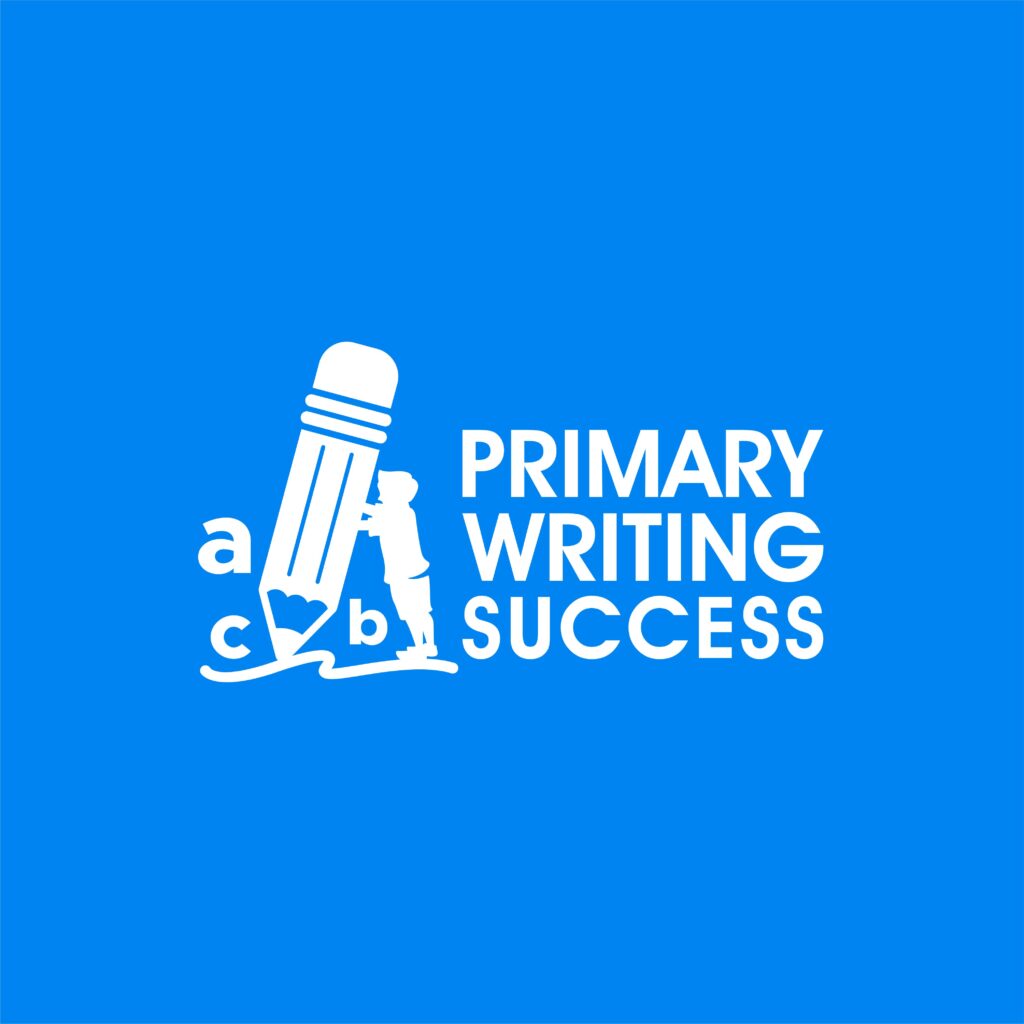
Finally, to learn more about launching this model, you can sign up for my completely free webinar: “How To Implement Writing Workshop In K-2.” During this, I cover how to structure your writing block and help your students come up with their own topics. We talk a lot about building independent writers. You’ll also receive some free printable materials and lesson plans!
Happy teaching!
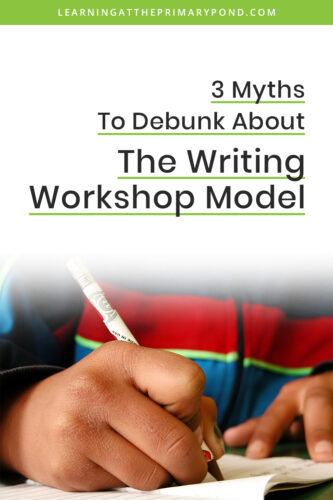
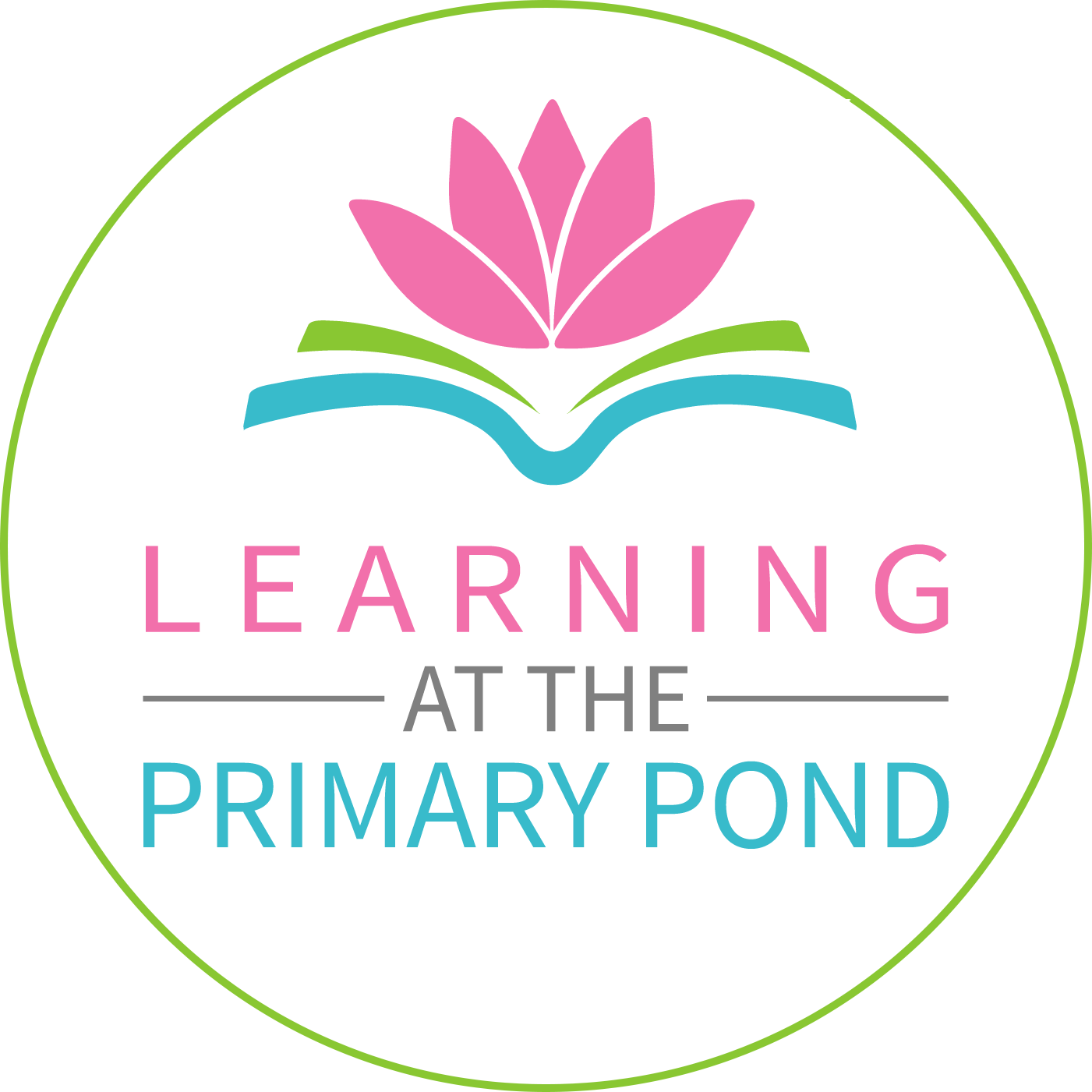
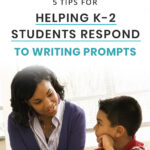

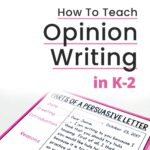
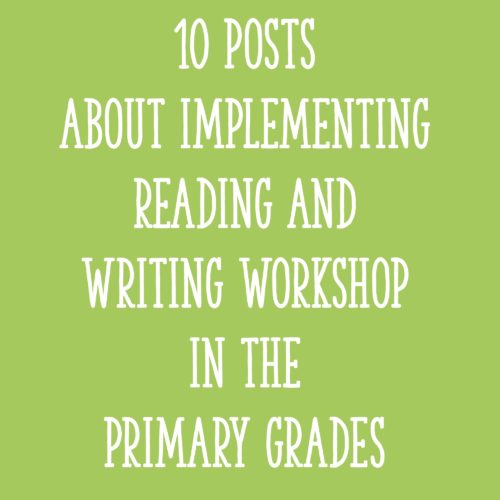
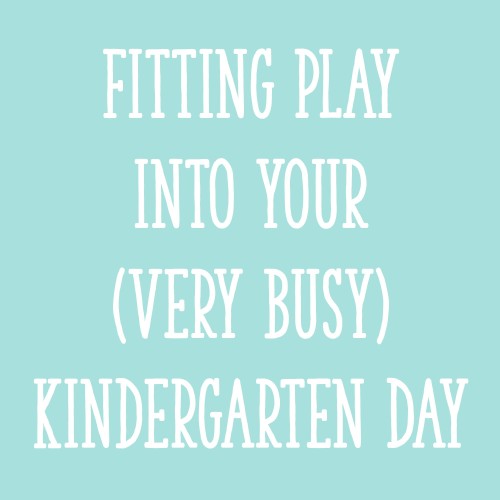
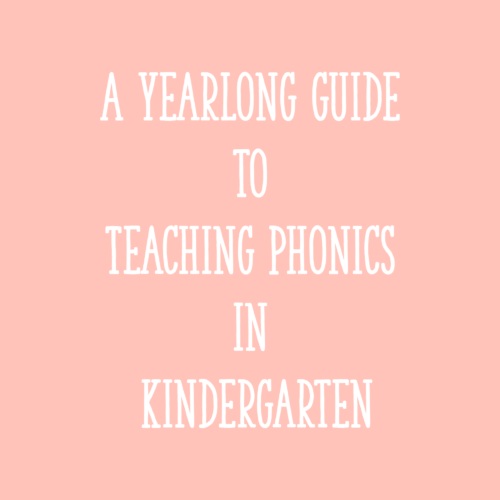


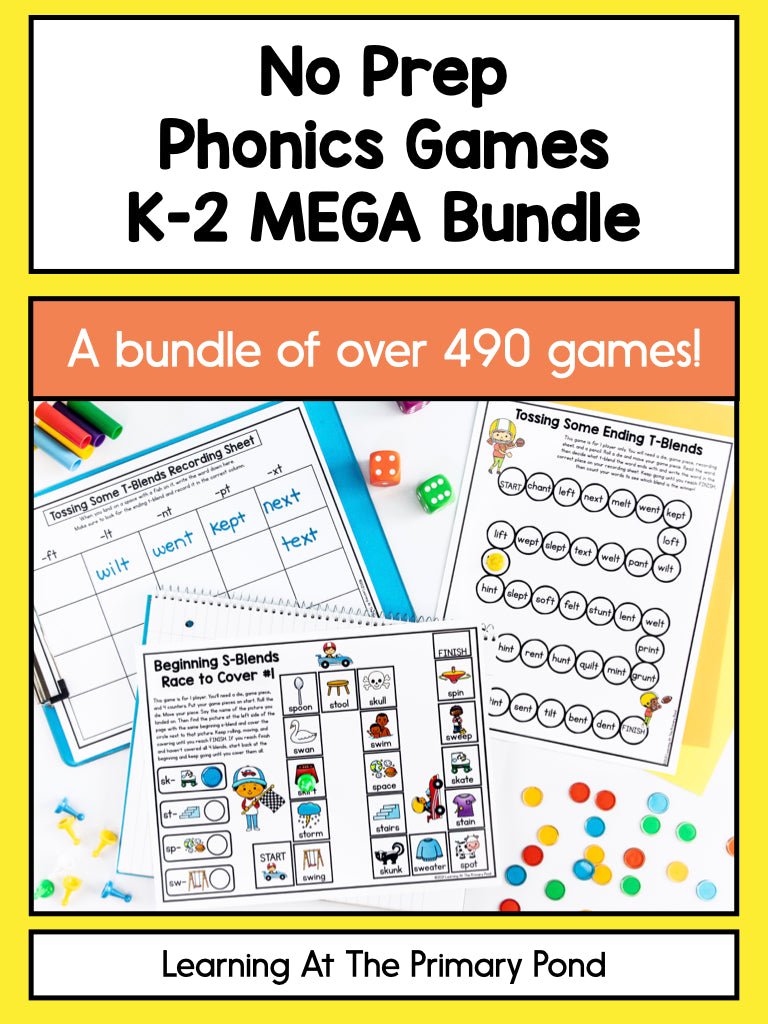
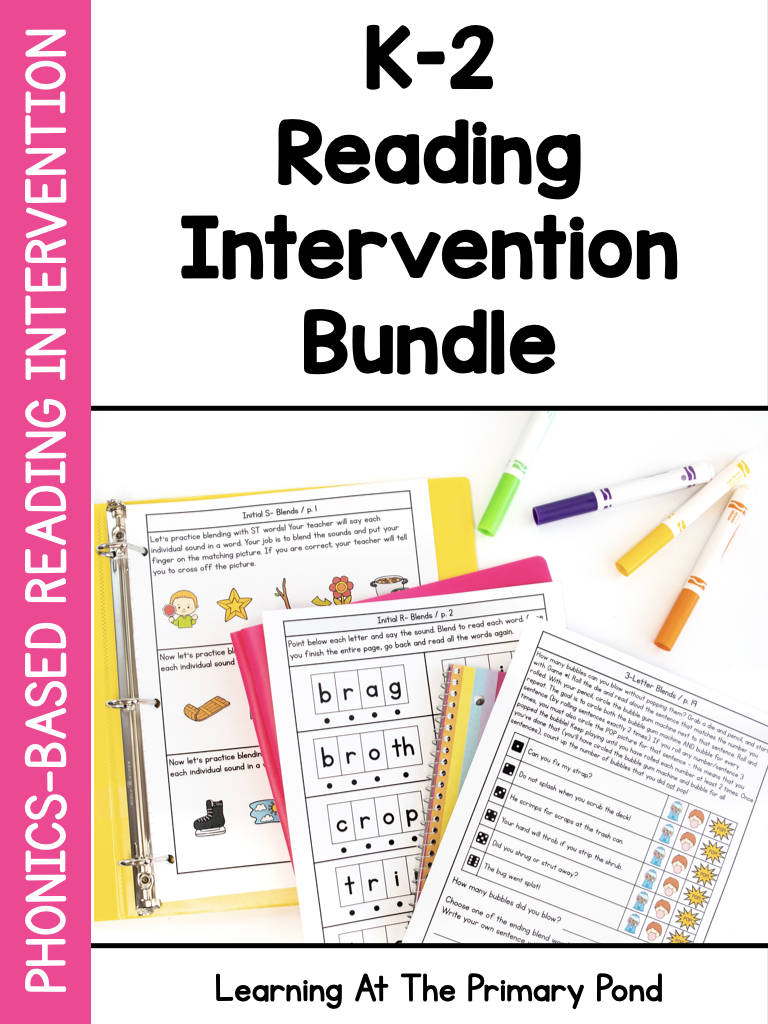
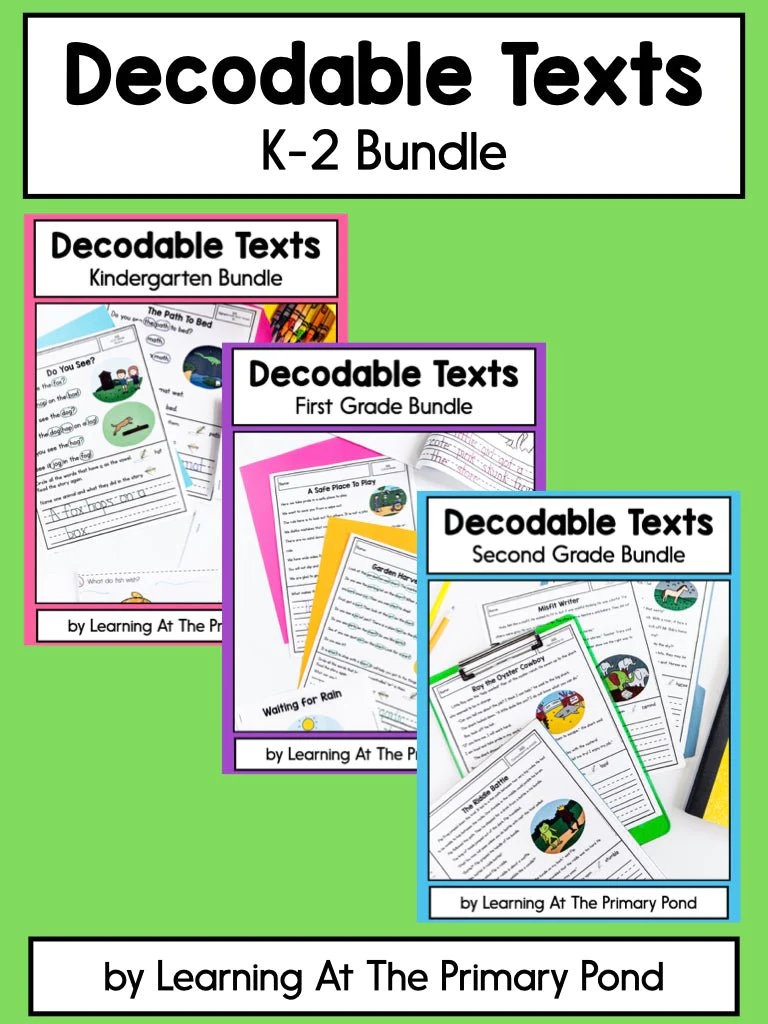
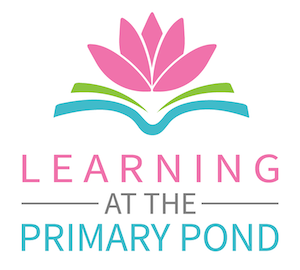
Hello,
I was interested in the free writing workshop folder and digraph and vowrl sound charts that you mentioned. I do see the link anywhere. Could you help me out?
Here’s the link for that – https://www.learningattheprimarypondresources.com/free-writing-folder-tools